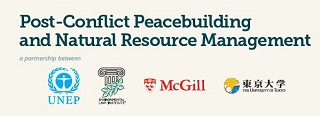Post-Conflict Peacebuilding and Natural Resource Management
Discussion details
Innovative new research programme launched

Natural resources are often closely linked to conflict, stabilization, and peacebuilding. Grievances over access to land have been central to wars in Guatemala and Nepal; and inequitable sharing of oil and gas revenues have driven separatist movements in South Sudan and Aceh. Revenues from diamonds, timber, and other conflict resources have provided financing for armed groups, including in Sierra Leone, Liberia, and DR Congo.
Natural resources are also central to building a durable peace after conflict, and are increasingly important in the conclusion of peace agreements. Land, minerals, and other resources provide livelihood options necessary to reintegrate former combatants and displaced people. Rebuilding livelihoods and the national economy depends on how post-conflict countries manage their land, extractive resources, and renewable resources. Restoring water, electricity, and other basic services requires effective utilization of natural resources. Natural resources provide revenue streams that are essential to supporting government operations, and improving governance usually requires addressing past inequities and corruption associated with the trade in natural resources and management of resource revenues. Cooperation around shared resources can be used as a platform to build trust and confidence among divided communities.
The post-conflict period presents a window of opportunity to address the underlying causes of conflict, manage the legacy of conflict, and lay the foundation for a durable peace and sustainable development. Natural resource management provides multiple opportunities to advance peacebuilding objectives, providing tangible peace dividends that can propel the peace process forward. Conflict-affected states face many challenges in leveraging their natural resource heritage for peacebuilding, including a growing global demand for resources, an intensified resource scramble in fragile states and post-conflict countries, and weakened capacity. Under these conditions, such countries are particularly vulnerable to poor contract terms, non-transparent decision making, corruption, and other negative impacts. The stakes are high; choices made early in the peacebuilding process tend to get locked in for decades.
To learn from past experiences in post-conflict peacebuilding and natural resource management, UNEP and ELI together with McGill University and the University of Tokyo coordinated a groundbreaking research program involving over 225 experts from 50 countries. A wide range of natural resources are considered, from oil and minerals, to water and land, to timber, fisheries, and agricultural products. The program aims to identify the ways in which good governance and effective resource management can enhance post-conflict peacebuilding and reverse the resource curse--in short, capitalizing on the promise and avoiding the peril.
This innovative research program is producing six thematic books with 150 case studies of experiences and lesson learned from 60 conflict-affected countries, and one overarching book that synthesizes the findings across resources, countries, and peacebuilding activities. These books provide a critical source of knowledge for the design of policies, programs, and training across the UN system and other international actors.
For more information on the project:
Carl Bruch (bruch@eli.org); David Jensen (david.jensen@unep.org)
>> Visit environmentalpeacebuilding.org
Log in with your EU Login account to post or comment on the platform.